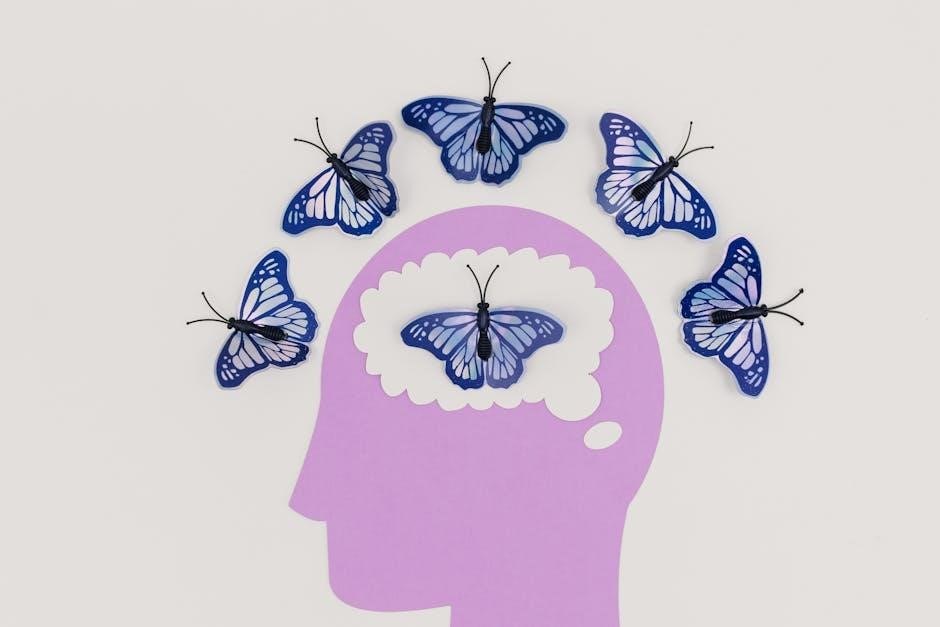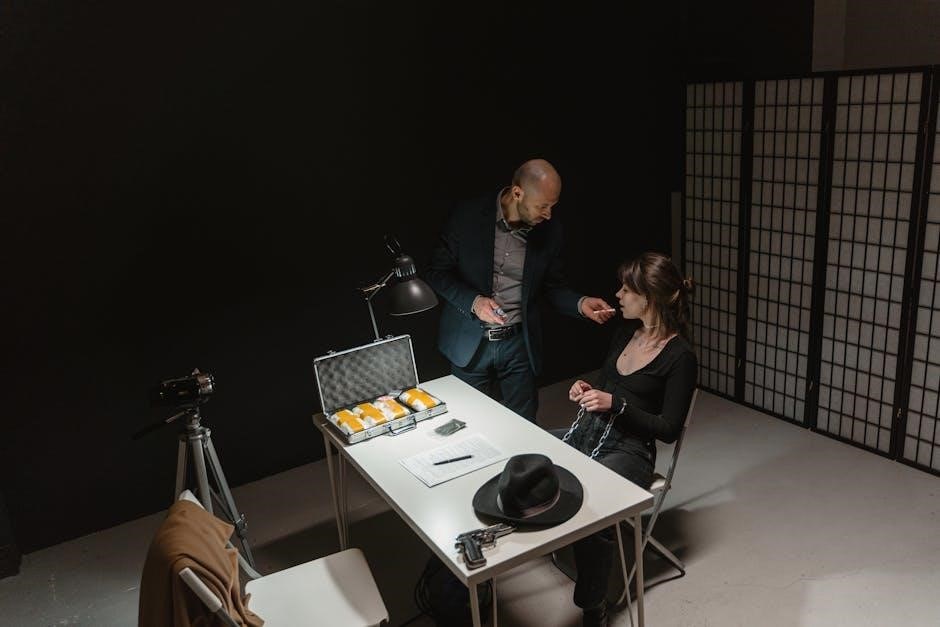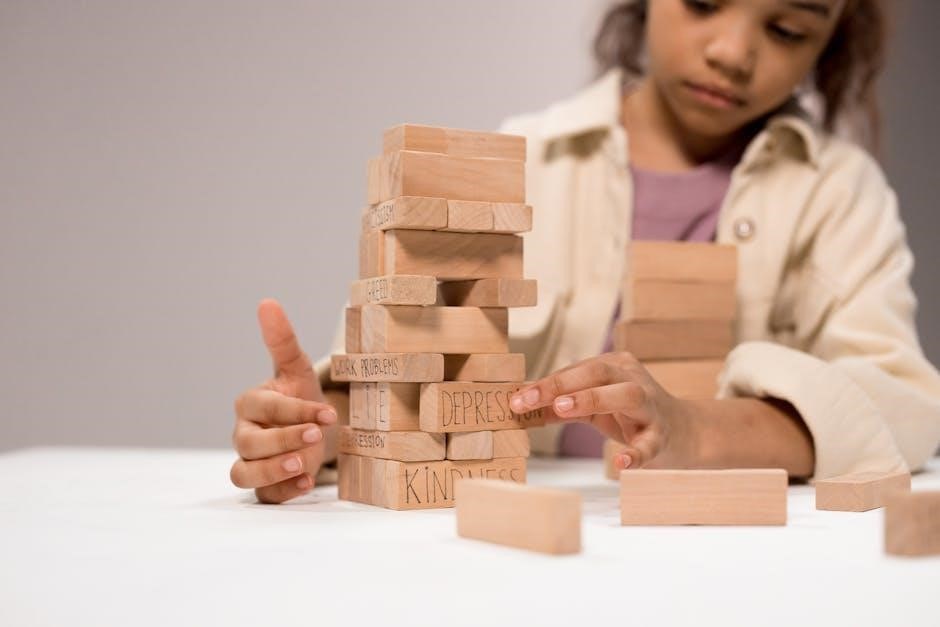Therapy Jenga combines the classic game with thought-provoking questions to foster emotional expression, trust, and engagement. It’s a versatile tool for individual, group, or family therapy sessions.
What is Therapy Jenga?
Therapy Jenga is a therapeutic adaptation of the classic Jenga game, where each block contains a thought-provoking question. Players take turns removing a block and answering the question, fostering open conversation and emotional exploration. This engaging tool is widely used in therapy settings to encourage clients to express their feelings, share experiences, and build trust with therapists or peers. By combining physical activity with meaningful dialogue, Therapy Jenga creates a unique and effective environment for personal growth and connection.
The Purpose of Jenga Questions in Therapy
Jenga questions in therapy are designed to encourage emotional expression, deepen self-reflection, and foster meaningful conversations. By incorporating open-ended queries on Jenga blocks, therapists create a engaging and non-threatening way for clients to explore their thoughts, feelings, and experiences. These questions help clients process emotions, develop coping strategies, and build trust with their therapist or group. The interactive nature of the game makes it an effective tool for breaking the ice, promoting insight, and enhancing therapeutic outcomes in a fun and dynamic manner.

Benefits of Using Jenga Questions in Therapy
Therapy Jenga questions encourage emotional expression by creating a safe space for clients to share feelings. The interactive game helps children articulate emotions they might otherwise struggle to express.
Encouraging Emotional Expression
Therapy Jenga questions are designed to create a safe space for clients to explore and articulate their emotions. By combining physical play with meaningful queries, the game helps individuals express feelings they might struggle to verbalize; The dynamic nature of the questions encourages openness, allowing clients to reflect on experiences, fears, and passions. This approach is particularly effective with children and teens, who may find it easier to share emotions in a playful, non-threatening environment. The game’s structure fosters connection and deeper self-awareness, making it a powerful tool for emotional growth.
Building Rapport and Trust
Therapy Jenga is an engaging tool for building rapport and trust between clients and therapists. The interactive nature of the game creates a shared experience, fostering connection and collaboration. Clients often feel more comfortable opening up in a playful, non-threatening environment. The process of taking turns and sharing thoughts encourages mutual understanding and empathy. This collaborative approach helps break down barriers, allowing clients to feel safe and supported. Over time, the game becomes a powerful way to strengthen the therapeutic relationship, making it easier for clients to share personal insights and emotions.
Enhancing Engagement in Therapy Sessions
Therapy Jenga is a dynamic tool that enhances engagement by combining physical and mental activities. The hands-on nature of the game captivates clients, making therapy feel less intimidating and more interactive. The unpredictability of the game keeps clients focused and invested, fostering a sense of excitement and curiosity. By integrating meaningful questions with the physical act of playing Jenga, therapists can create a unique experience that encourages active participation and deeper involvement in the therapeutic process. This approach makes therapy sessions feel more like a collaborative activity than a traditional intervention.

Types of Jenga Questions
Therapy Jenga offers diverse question categories, including icebreakers, emotionally focused prompts, coping skills, and hypothetical scenarios, tailored to explore emotions, build rapport, and enhance problem-solving abilities effectively.
Icebreaker Jenga Questions
Icebreaker Jenga questions are designed to create a relaxed atmosphere, helping clients feel comfortable and engaged. These questions focus on lighthearted topics, such as favorite hobbies, childhood memories, or fun hypothetical scenarios. They encourage participation and set the stage for deeper conversations. For example, questions like, “If you could have any superpower, what would it be?” or “What’s your favorite way to spend a weekend?” are popular choices. These icebreakers are ideal for the initial stages of therapy, fostering connection and reducing anxiety. They also help therapists gauge clients’ interests and preferences, making sessions more personalized. By starting with these engaging prompts, clients can gradually open up, building trust and rapport with their therapist. This approach ensures a smooth transition into more meaningful discussions, making therapy a more enjoyable and effective experience. Additionally, icebreaker questions can be adapted for various age groups, ensuring relevance and effectiveness across different client demographics. They are a simple yet powerful tool in the therapeutic process, facilitating communication and setting a positive tone for future sessions. Overall, icebreaker Jenga questions provide a fun and interactive way to initiate meaningful dialogue, making them a valuable asset in any therapeutic setting.
Emotionally Focused Jenga Questions
Emotionally focused Jenga questions are crafted to help clients explore and express their feelings in a safe, structured environment. These questions address topics like fears, regrets, and stressors, encouraging deeper self-reflection. Examples include, “What’s your biggest fear and why?” or “What makes you angry?” These prompts facilitate emotional processing, helping clients identify and understand their emotions. They also provide insights into coping mechanisms and personal growth areas. By addressing emotional challenges directly, these questions support therapeutic progress and foster a greater sense of self-awareness. They are particularly effective for clients who struggle to articulate their feelings, offering a guided pathway to emotional exploration and healing.
Coping Skills and Problem-Solving Questions
Coping skills and problem-solving Jenga questions empower clients to identify strengths and strategies for managing challenges. These questions, such as “What are two positive words that describe you?” or “Share a time when you were helpful to someone,” encourage self-reflection and resilience. They help clients explore ways to navigate difficulties and develop actionable plans. By focusing on problem-solving, these prompts enhance critical thinking and adaptability, aiding clients in building practical tools for real-life situations. These questions are particularly effective for fostering personal growth and adaptive behaviors.
Hypothetical Scenario Questions
Hypothetical scenario questions in Therapy Jenga encourage clients to explore their thoughts and feelings in a safe, imaginative space. These questions, such as “If you could change one thing about your past, what would it be?” or “What would you do if you could switch lives with someone for a day?” prompt creative thinking and problem-solving. They help clients reflect on values, behaviors, and decision-making processes. By engaging with “what if” situations, individuals gain insight into their reactions and coping strategies, fostering self-awareness and personal growth.

How to Create Your Own Therapy Jenga Game
Gather a Jenga set, printer, and paper. Write meaningful questions, print, and laminate them. Attach each to a block. Customize for individual or group therapy needs.
Materials Needed
To create a Therapy Jenga game, you’ll need a standard Jenga set, a printer, and paper or cardstock for printing questions. A laminator is optional for durability. Use customizable question templates or design your own using software. Scissors, glue, or a label maker can help attach questions to the blocks. Optionally, add colorful markers or stickers for personalization. Ensure the materials are accessible and easy to use for clients of all ages and abilities. This setup allows for a versatile and engaging therapeutic tool.
Writing Effective Questions
Effective Therapy Jenga questions should be open-ended, age-appropriate, and tailored to specific therapeutic goals. They should encourage emotional expression, self-reflection, and meaningful conversations. Questions can focus on feelings, experiences, goals, or hypothetical scenarios, ensuring they are engaging and relevant to clients. Avoid overly complex or sensitive topics initially; instead, introduce them gradually to build trust. Use clear and concise language to ensure understanding and comfort. Questions should also be adaptable to suit individual, group, or family therapy needs, fostering a dynamic and impactful experience.
Designing and Printing Question Cards
Creating effective question cards for Therapy Jenga involves designing clear, engaging, and therapeutically relevant prompts. Use cardstock or durable paper for longevity and print questions in large, easy-to-read fonts. Consider color-coding or symbols to categorize questions by theme or difficulty. Ensure questions are concise and open-ended to encourage meaningful discussions. Many free PDF templates and customizable designs are available online, allowing you to tailor cards to specific therapeutic goals or client needs. Print and cut cards neatly for professional presentation.

How to Play Therapy Jenga
Basic Rules of the Game
Therapy Jenga begins with players taking turns removing blocks from the tower. Each block has a question or prompt related to emotions, goals, or experiences. The player must answer the question before placing the block on top. If the tower falls, the game ends. Players can also earn passes to skip difficult questions, providing insight into their comfort levels. The goal is to balance physical skill with emotional engagement, creating a safe space for meaningful conversations and self-expression.
Adapting the Game for Different Client Needs
Therapy Jenga can be tailored to suit various clients by adjusting question complexity, game structure, and emotional focus. For children, simpler questions and visual aids enhance engagement. For teens or adults, deeper, emotionally focused prompts encourage introspection. In group settings, team play fosters collaboration, while individual sessions emphasize personal reflection. Allowing “passes” for difficult questions provides flexibility, ensuring the game remains therapeutic while respecting clients’ boundaries and needs.

Using Jenga in Different Therapeutic Settings
Jenga is versatile in individual, group, and family therapy, promoting emotional expression, trust, and connection. It adapts to diverse needs, fostering engagement and therapeutic growth.
Jenga for Individual Therapy Sessions
In individual therapy, Jenga questions help clients explore emotions, goals, and coping strategies. The interactive nature of the game creates a relaxed environment, encouraging openness and self-reflection.Tailored questions address specific needs, fostering deeper insights and personal growth. Therapists can adapt the game to focus on emotional expression, problem-solving, or trust-building. The process of drawing and answering questions allows clients to process experiences at their own pace, while the physical act of playing Jenga adds a calming, grounding element to the session.
Jenga for Group Therapy Sessions
Jenga is an engaging tool for group therapy, fostering teamwork and communication. Participants take turns removing blocks with questions, sharing thoughts, and reflecting on others’ responses. This activity encourages collaboration, trust, and empathy among group members. It also helps individuals connect on a deeper level, breaking down barriers and fostering a sense of community. The dynamic nature of the game promotes active listening and mutual support, making it ideal for exploring shared experiences and building collective problem-solving skills in a fun, interactive way.
Jenga for Family Therapy Sessions
Jenga is a powerful tool for family therapy, fostering communication and understanding. Each family member takes turns removing blocks with questions, encouraging open dialogue about feelings, values, and experiences. This interactive approach helps identify and address conflicts, strengthen bonds, and promote empathy. The game’s engaging nature makes it accessible for all ages, allowing families to connect on a deeper level. It also provides a safe space for emotional expression, guided by a therapist to ensure constructive conversations and positive outcomes for the entire family.
Downloadable Resources for Therapy Jenga
Find free Jenga Questions PDFs online, offering dynamic and engaging prompts for therapy sessions. Customize templates to suit your needs and download printable question cards easily.
Free PDF Downloads of Jenga Questions
Access a variety of free Jenga Questions PDFs designed for therapy sessions. These downloadable resources include dynamic prompts covering emotions, goals, and hypothetical scenarios. Perfect for icebreakers or deep dives, they offer flexibility for individual or group settings. Many PDFs are customizable, allowing therapists to tailor questions to specific needs. Print and attach them to Jenga blocks for engaging activities that encourage open dialogue and emotional expression. These resources are ideal for school counseling, family therapy, or group workshops.
Customizable Jenga Question Templates
Customizable Jenga question templates offer flexibility for therapists to tailor questions to specific client needs. Downloadable PDFs allow easy editing, enabling therapists to create personalized prompts for individual, group, or family sessions. These templates can focus on emotional expression, coping skills, or relationship-building, ensuring relevance and engagement. Print and attach them to Jenga blocks for a dynamic therapeutic tool. This adaptability makes Jenga therapy accessible and effective for diverse settings and client demographics, fostering meaningful conversations and connection.
Therapy Jenga questions offer a dynamic, engaging way to foster emotional expression and connection. Their adaptability makes them a valuable tool for mental health professionals and clients alike.
The Future of Therapy Jenga in Mental Health
Therapy Jenga is poised to become a cornerstone in mental health, offering a unique blend of playfulness and depth. Its adaptability across ages and settings ensures widespread applicability. As digital tools evolve, customizable PDFs and online platforms will make it more accessible. This innovative approach fosters connection, emotional exploration, and problem-solving, making it a valuable asset for therapists. Its future lies in continuous innovation, expanding its reach to diverse populations and enhancing its therapeutic potential through creative question design and gameplay variations.
